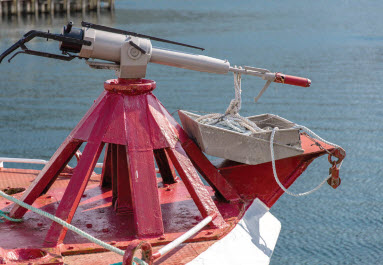Advocates Condemn Norwegian Whale Hunt
A coalition of international whale protection organizations has condemned the start of Norway’s 2017 whaling season, which began on April 1.
The coalition believes the hunt could result in the cruel slaughter of up to 999 minke whales, a self-allocated quota more than 100 higher than that set by the Norwegian government in 2016.
The increased quota comes as domestic demand for whale meat has flagged and international exports of Norwegian whale products have escalated, in contravention of global bans on both commercial whaling and international trade in whale products.
This year’s whaling quota, which is not authorized by the International Whaling Commission (IWC), allows hunting in areas where it is known that most of the whales will be female and pregnant and cements Norway’s status as the world’s number one whale-killing nation.
“Norway is a modern nation but its whaling practices are cruel, irresponsible, unnecessary and frozen in time,” said Jennifer Lonsdale, Environmental Investigation Agency senior oceans campaigner. “Norway’s reputation is consistently stained by the blood of the sentient and intelligent whales that it kills. It ignores the important contributions the whales make to maintaining healthy marine ecosystems, including in Norwegian waters.”
 Norway has slaughtered more than 12,000 whales since 1993, despite the IWC’s longstanding ban on commercial whaling. Per Sandberg, Norway’s minister of fisheries, recently indicated he would like to see this year’s quota of 999 whales double in the future despite no endorsement by the IWC Scientific Committee that such an annual body count is sustainable.
Norway has slaughtered more than 12,000 whales since 1993, despite the IWC’s longstanding ban on commercial whaling. Per Sandberg, Norway’s minister of fisheries, recently indicated he would like to see this year’s quota of 999 whales double in the future despite no endorsement by the IWC Scientific Committee that such an annual body count is sustainable.
“It is the height of biological recklessness for Norway to set whaling quotas that the world’s leading cetacean scientists have not declared to be sustainable,” says Nicolas Entrup, consultant to OceanCare. “Ultimately, however, this is not an issue of what is sustainable. Rather, it’s about what is necessary—commercial whaling is no longer necessary and the global ban must be enforced.”
Norway’s rapidly growing trade in whale products is also cause for concern, says OceanCare. In 2016 alone, it exported 197 metric tons of whale meat and blubber to Japan, more than in the previous two years combined, all in defiance of the international ban on the commercial trade in whale products imposed by the Convention on International Trade in Endangered Species of Wild Fauna and Flora (CITES).
“Norway is hiding behind its objections and reservations to decisions agreed to in international treaties, by continuing to peddle its whale products internationally,” said Dr Sandra Altherr, a biologist with Pro Wildlife. “Norway must comply with its obligations under these treaties and embrace the fact that whales are worth far more alive than dead, and the European Union must urgently and strongly oppose Norwegian whaling in European waters.”
The organizations fear that increased international trade helps keep afloat an industry that has been struggling, given a decline in demand for whale meat in Norway. In January 2017, for example, approximately 60 tons of minke whale meat was donated to Norwegian soup kitchens and senior centers, as businesses sought to offload unsold product approaching its sell-by date. In addition, in recent years, more than 100 tons of whale products were delivered to Rogaland Pelsdyrfôrlaget—the largest manufacturer of animal feed for the Norwegian fur industry.
“This cruel industry is dying as demand for whale products in Norway evaporates,” said DJ Schubert, wildlife biologist with the Animal Welfare Institute. “It is time for Norway to discard the harpoons and end the unnecessary suffering of whales and their unborn offspring by prohibiting commercial whaling; no other alternative is acceptable.”
The opinions expressed herein are the author's and not necessarily those of The Maritime Executive.
